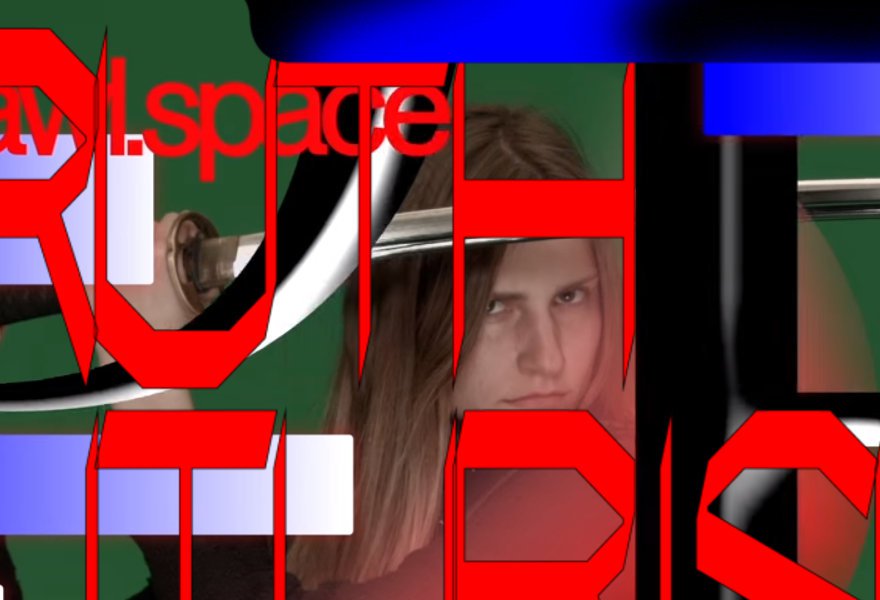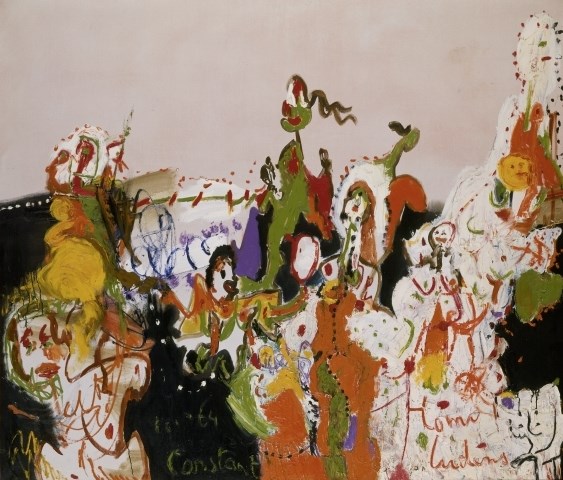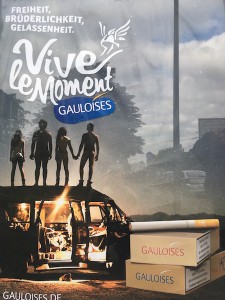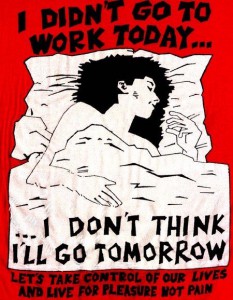Last September, after visiting the exhibition about Constant Nieuwenhuys’s ‘New Babylon’ in The Gemeentemuseum Den Haag, I delved into his work and ideas. I came a across a movie about Constant titled: City Rising by Metahaven. Intrigued by this contemporary view on Constant’s thoughts of society, I started to examine the thoughts of Metahaven on the web and especially found one of their latest works called The Sprawl (Propaganda about Propaganda), interesting. Having seen the exhibition and both the works from Metahaven, in my opinion the freedom of the individual is central in all three. Though the way the individual is presented by both Constant and Metahaven, especially in The Sprawl is entirely different. This led me to ask some questions:
Can we actually call ourselves free individuals with all the contemporary propaganda thrown at us? Should we act more towards Constant’s ideas? Is Metahaven pushing us into the right direction?
To explain my thoughts and to enlarge upon these questions, first I’d like to shortly introduce Constant’s ‘New Babylon’, Metahaven (City Rising) and The Sprawl and later on give insight to a correspondence between Metahaven and me.
New Babylon
‘New Babylon’ is the imagination of a progressive and modern utopian society by Constant Nieuwenhuys by means of maquettes, drawing, movies, graphics and manifests. In ‘New Babylon’ dynamics are crucial and where the inhabitants arrange their artificial environment. An automated community where labor is unnecessary whereby everyone can fully focus on developing their creative ideas. The individual decides how it’s habitat looks like without any restrictions or creative borders.
Metahaven
Metahaven is a Dutch design group based in Amsterdam founded by Daniel van Der Velden and Vinca Kruk. They’ve already had many exhibitions including the MOMA PS1 in New York and the Museum Of Modern Art in Warsaw. The group released several films and graphic designs focusing on contemporary political and social issues. For this instance City Rising (2014); a homage to Constant Nieuwenhuys’s ‘New Babylon’. The film is an exploration of the individuals’conditions of life, work, and love in neo-liberal times where the architectural maquettes of Constant’s ‘New Babylon’ are displayed in the video. This is a general example of what Metahaven deals with.
The Sprawl (Propaganda About Propaganda)
The Sprawl is a multi-channel video installation, feature-length film and episodic online documentary that considers the “ways in which fantasy can be designed so as to seem or feel like a truth”, as Daniel van der Velden describes and states that the Internet has become a disorganized geopolitical super weapon. Where, for example, funny cat videos distract us from urgent matters and that’s where The Sprawl jumps in by asking pressing questions about the internet in relation to our idea of the independent individual few others dare to ask. Looking at the design one can see that The Sprawl is a paranoid, digital trip in which the form and content keep on influencing each other in combination with futuristic beats and sounds by Kuedo, green screen-manipulations and glitch elements which deliver a chaotic and high pressuring image to the viewer.
All the different parts of The Sprawl, the so called “Shards”, can be found on the website sprawl.space; the interface of the project.
The Contemporary Individual
In both Constant’s ‘New Babylon’ and Metahaven’s The Sprawl, there is an interesting and different way how they approach and think of the individual. Constant claims –for his utopia to fully act well– that every individual should be able to free himself from daily routines such as labor, to become an adventurous, playful and dynamic human being, what he calls the ‘Homo Ludens’. So as a community, all individuals can create a new society where everything can be artificially influenced. Metahaven puts a question mark over the reliability of the internet and the information flows the individual engulfs. What is fantasy and what is real and objective? The internet makes extensive use of propaganda where the individual only gets the information certain people wants them to get. The Sprawl is trying to clarify this; that third parties and the internet form the individual by deciding which and what kind of information we can assume to be relevant. Metahaven tries to convince us we’re not that much of individuals at all, because of all the contemporary propaganda thrown at us.
In the correspondence between Metahaven and me, I asked them a question about The Sprawl to better understand the true meaning and purpose of the project.
My question: (Translated from Dutch) “How does Metahaven thinks to convince the individual by means of The Sprawl that the information we absorb in our daily life is manipulated; and in what way their chosen design contributes to this goal?”.
Unfortunately Metahaven didn’t want to answer the question based on the facts that they don’t speculate about their own made work not knowing what will be written about it and they don’t want to interpret their own work; they are of course fully entitled to do so.
However, they did send interesting references to articles which already conduce to better understanding The Sprawl. Troubled I couldn’t completely understand the project first;
from the article of Ruth Saxelby (see link below), it became clear this is actually a conscious choice of Metahaven:
-The Sprawl is less concerned with what “the truth” is, and more interested in the impact that the internet avalanche of conflicting truths has on the reality we experience, both individually and collectively.-
-The Sprawl’s tagline is “propaganda about propaganda,” and its third manifestation—dropped like breadcrumbs across YouTube—is the one that feels closest to the spirit of the project; its fragmentation is a reflection of the way we half-see, half-read, half-understand the world in these hyper-distracted times. But what does propaganda even mean today?-
“I used to think that propaganda was about persuading people. Jacques Ellul who wrote the classic study of propaganda in the 1960s, French philosopher, called it mass persuasion. He didn’t say propaganda was good or bad, he said it was a part of modern society, a part of technological society, a part of mass industrialized society, whether it’s getting people to wear condoms or to get them to become Maoists. Soviet propaganda used to be, ‘Believe in communism, Moscow is the shining beacon on the socialist hill.’”
“Now it doesn’t seem to be about that. It’s just about deconstructing the other side, disrupting Western narratives, of any sort. There’s a steady stream of disinformation whose purpose seems to be to sort of undermine the very idea that truth is provable.”—Peter Pomerantsev, The Sprawl
Metahaven Is Breaking The Propaganda Machine – The FADER–
Every individual has the right to create it’s own truth and what to believe. The internet gives us the idea we get equal choices and information flows, though this isn’t true. Big parties as multinationals, internet-companies and media-tycoons or even Metahaven, have a greater possibility to proclaim their “truth”. The individual is often not aware where certain information arises from.
To get back to Constant and Metahaven together. It indeed seems we, the many individuals, are trapped between many flows of information each claiming to proclaim the truth; while no one really knows what is the “truth” nor whether it exists, and far from being able to call ourselves “Homo Ludens”.
Constant Nieuwenhuys,’Homo Ludens’, 1964. picto©Constant Foundation/SM



